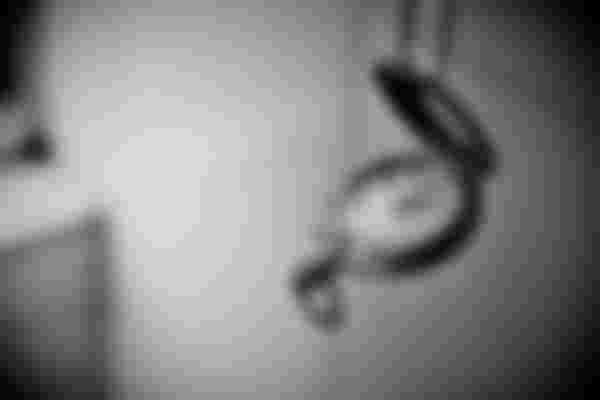
The former is the most precious commodity; whilst the latter is still vague but feared by many.
I was just lying in my bed, scrolling, browsing through my phone. It was late in the evening and I engulfed myself in the darkness. I love the silence the night brought to me at this time; it offers a strange combination of peace, solitude, and loneliness. Not to mention a time to think deeply; time to reflect on my existence and the universe. I barely experience silence at night, not even on day time, simply because I am surrounded by activity, humming machines and various other background noise. I wonder, in this fast-moving world we now live in, where we're almost always online 24/7, when was the last time you had experienced silence?
Technology had allowed us to create our filtered, fine-tuned digital-self; which affirms to Descartes', or to Plato's philosophical claim: That there are two substances, or to put it simply — a two forms of reality. On the one hand there is the outer reality, and on the other, a virtual reality — which is both essentially different from one another. However, on which reality do you spend your time more? Do you engage more in a physical activity, or play online games instead? In the near future, probably, we'll live more and more in a seemingly physical yet metaphysical virtual world. But what is virtual self if outside it we're nothing?
We'd spent most of our time in virtual world, for whatever reasons we may have: For entertainment; chatting a love ones; seeking validation on our existence online; looking for a virtual friends who can somehow understand our struggles, pain, undertakings and miseries — indeed a coping mechanism, a medium, an outlet to transcend our frustrations and happiness from the real world.
How'd you utilize your digital self, really? Do you pass valuable information or share memes instead? Do you promote humanity? Do you use it to champion mental health? Do you interact or nurture relationships? Or, do you wield it to degrade and/or belittle others? Do you help the culture of constant upstaging persist? How your digital-form does helps your real-self grow?
I stumbled upon Antonio de Peredra's “Allegory of Vanity” online, a work of art that portrays several representations of the passage of time. A clock, an hourglass, a globe; there were pearls, gold, coins and jewels scattered around it, as well as some skulls — a portrayal of wealth and human pleasure, as well as ephemerality and death. Time and death.
Two of the many many mysterious concepts that has been argued and discussed at length. These two abstractions affects how human live their lives. It has an impact on how we communicate, engage, and connect with other people. Both shares a common denominator that connects every human beings on earth — and that is fear. This is why everyone fears of running out of time, why we desire to have more of it. Everyone fears losing loved ones, even losing our very own life. The fear of marching down towards oblivion haunts us. Death.
Is there a way to beat it really?
What's use of pursuing all of the earthly desires when none of it can we bring when we die?
Can we, let alone other creatures, persist to exist after dying, or desist to exist without dying?
Why try to think it deeply when we can't do anything to evade it? Why not just continue to live, and then die?
Our fear of the unknown had immured most, if not all, of us into a so-so, mediocre existence. Unknown, as in plainly anything that we have no knowledge of, i.e., death. What we know of death is just simply a death of other; a friend, a family member, a colleague, or a pet — but we don't how it exactly feels like being a corpse, and/or what lies beyond life. Thus, death remains a unique human experience. We, as being (in a discreetly ontological sense of the term), as we come to life, is, to follow Heidegger, old enough to die. It has been there, and will always be there before we become conscious about it. Death is always personal, a modus operandi, a process from Dasein (being there) to no-longer-Dasein. Memento mori.
Rollo May an existential psychologist believed that our ultimate destiny state of all is death and admitted that such destiny like death cannot be erased. However, he believed that people can choose how to respond and confront or experience our existence.Then again, there is a medical procedure called Cryonics, a method of preserving human body in hope that someday, in the future, through the advancement of medical technology we can be reanimated. There's now an idea, a tool, a procedure, a way of somehow beating our impending end.
Well, I wonder. Just some sort of a cliche of questions: Is death a portal to another life, just like what the prevalent religious concept says — that there is life after death? Or it is just a simple termination of life? Depends I think on which lens we are using. It varies if we are a physicist, biologist or philosopher. But death perhaps is an absolutely empty concept trying to grasp by the human minds because to die is merely a detachment to the things, the people, the world where we are attached to, thus loosing all of these that we have ever pursue in life.
I checked my time on phone and it says 12:45 and I still consider this time as evening. I should have sleep to hibernate at this time; I should have read my pending books; I should have watched movies — but here I am, opted to write and finish this article. Some might be sleeping at this time; some might be doing something else, unaware of the time passing by. Time.
Well, isn’t everyone has their own concept of time? As the year comes to end, how do you use your time, really?
Move Slower.
A man who has been diagnosed with terminal illness with only three (3) months left on his time. He might be praying to all the gods to slow down the progression of his disease and decelerate the time itself so that he can live longer…or he is cursing the gods by now for the few months left for him.
One of the widely used effects on movie scenes is the slow motion when one is in love with the other. As they enjoy each other’s company, time flies faster therefore; wishing time to pause a little or cease around them.
Also, a woman soon to enter marriage, deep inside parents of these people realizes how their children became grownups and later fancies to go back in time when they’re still young.
Move faster.
A teenager locked up in his room, tired of dealing with life. For people suffering in terrible situations, they had hopes for time to move quicker. They want to end the burdens they carry.
A kid who kept telling his parents he’s grown up. It is a universal truth; kids want to become adults because of independence and freedom. Little did they know, how much burden people carry with freedom, Erich Fromm (a known humanistic philosopher) postulated the concept, burden of freedom. This means that as as a person expands his freedom or as he grows old, his responsibility increases and from time to time he has to make careful decision to not mess his life.
Alternatively, a father ordained to spend his duty as an army far away from his homeland. He is yearning for wars to end soon and finally caress the longing faces of his wife and children.
We have been used and conditioned to mark the seconds, minutes, hours, days, but how did you utilize them? Did you use it to lift, to motivate or to validate a person? Do you spend your time with loved ones, a family, a friend? To be grateful? To reflect?
I wonder. Have we become obssessed, attached with life, and with what we have, say the material possessions, in this world that we fear dying? Or we just simply fear something that is beyond the border of our comprehension such as death?
Maybe, indeed, the reason why we are a very limited creature, fleeting, bounded and moving in time, is just to simply savour and make each moment precious.
We have learnt to measure time, and thus, suffer for the thought of running out of it — on how long we would have live. The request of extented time became an endless demand. We become worried for the unproductive days we had, the progress we wanted to accomplish, the pile of papers we needed to finish. Maybe our temporality had pushed us into the pursuit of success and meaning forgetting the simple joy that a gesture of smile, hug and hello brings.
A time to reflect, be it about time and death, in a coffee-shop or inside the four corner of your room, one might say a lazy thing to do, but in my opinion, is a time worth-spending. Such reflections resolves such alienation with ourselves, a way to regain our Eigenwelt — and be reminded of us being "humans".

A very well written and thought of article. Time is finite in a life and death is the ultimate truth. Utilization of time is at the free will of humans. As man is a social animal so the undercurrents of society sweep us off the feet overshadowing our understanding of life. It is easier to flow with the current. But in between the rudder of the mind tries to guide us which generally subsides in the cacophony of societal pressure, till be reach a stage when death looks not so far. Then we rewind our life and procrastinate. But by that time the train has already left the station.